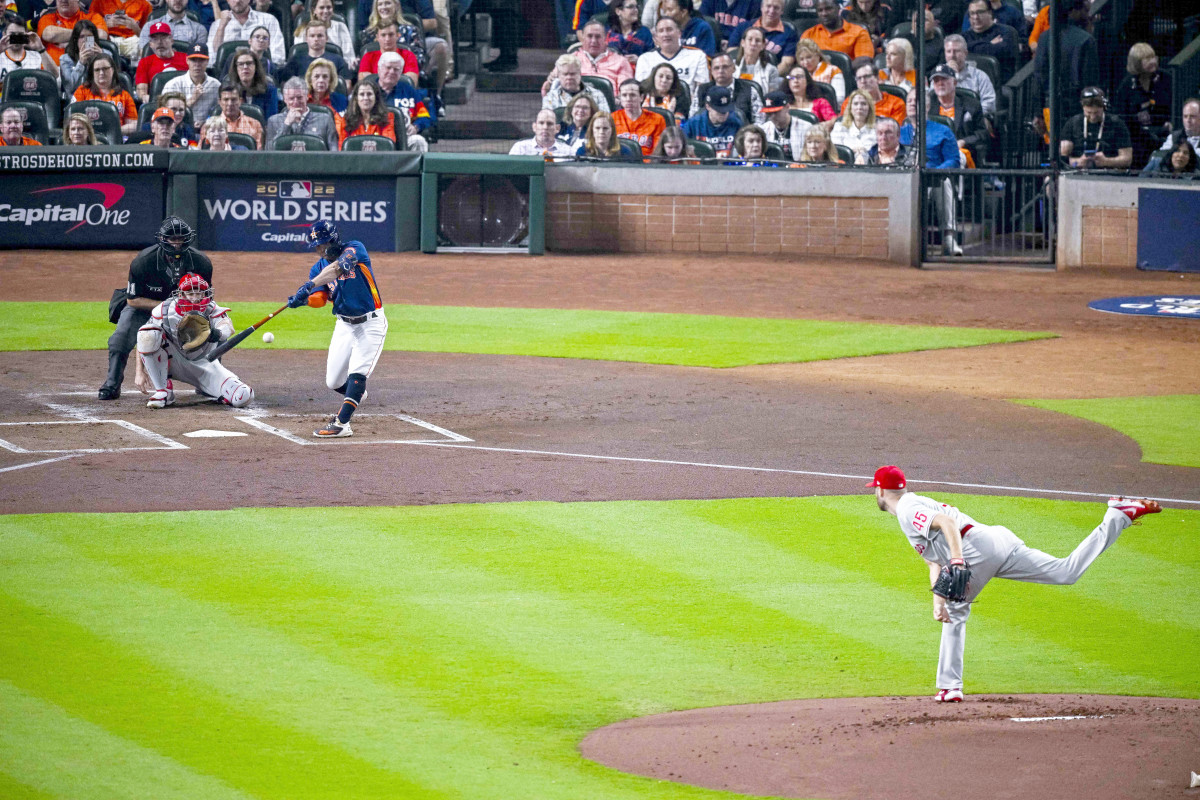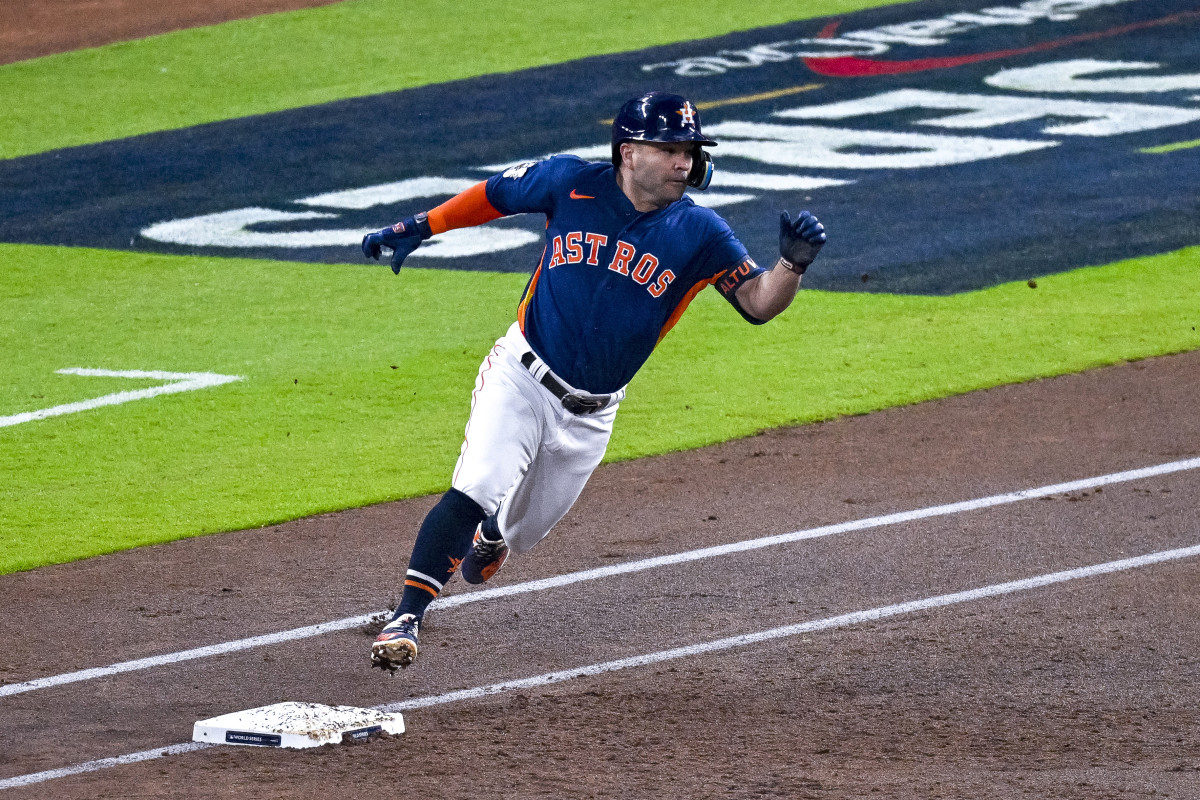Jose Altuve Is Back—Just in Time to Save the Astros
HOUSTON — Even atomic clocks need an adjustment. Twenty-seven times over the past 50 years a leap second has been added to the official time of humanity, Coordinated Universal Time. Reliable, and the official keeper of team equilibrium, Jose Altuve is the Astros’ atomic clock. To see him go 0-for-25 and go 24 days without hitting a fastball for an extra-base hit was to know time in Astroworld was akilter.
And then came the leap second that might have changed the series.
Altuve’s first swing on the first pitch thrown by Phillies starter Zack Wheeler in World Series Game 2 on Saturday recalibrated Astroworld. Altuve waffled a fastball from Wheeler 103.8 miles per hour for a double. It was his hardest hit off a fastball since Sept. 27—a month of fastballs, or 114 fastballs ago to be exact.
“Massive. Big. Huge,” Houston third baseman Alex Bregman says about what the first pitch of the game meant. “He means so much to us. We know when he goes, we go.”

Jeremy Peña followed with a double on the next pitch. Yordan Alvarez fouled off a pitch before he made it a triple double and a 2–0 Astros lead just four pitches into the game, a 5–2 Houston win.
Double, double, toil and trouble. Only this time it wasn’t eye of newt or toe of frog as the key ingredient in the witches’ brew for Philadelphia, but Altuve. He added two more hits, a single up the middle off a curveball and a ridiculous carnival trick of a single off another fastball. As if climbing atop stilts, or perhaps swatting at a piñata, Altuve raised to whack a 96-mph pitch above his head into right field.
“Only Altuve can hit that pitch,” catcher Martín Maldonado said. “Nobody has bat-to-ball skill like that. He’s probably the only player right now on his way to 3,000 hits. He has a batting title, an MVP, 200-hit seasons ... he’s on pace for the Hall of Fame.”
As important as was the first-pitch double he drilled, the center-ring trick shot single had its own value: it reaffirmed that Altuve, lost in a three-week funk, is back to his usual smiling, fastball-bashing self. He positively beamed at first base.
“In the beginning, I was hitting more and watching more videos, and then I stopped, and I was like hitting less and less,” Altuve said. “So I think that lately the less I get on my mind it's going to be better. So just try to simplify everything, go out there, like Alex said, look for one pitch and put a good swing on the ball. That's what I did the last few days and it's been working for me and I've been feeling way better.”
The Astros privately were concerned about Altuve’s funk. Altuve was the best slugger against fastballs this year other than Aaron Judge, and suddenly he could not time them. Before Game 1, hitting coach Alex Cintrón mentioned Altuve was “jumpy” in the box. Altuve’s swing has never been an oil painting of a swing. It’s more like graffiti—swirling, looping and bound by no order. His feet move about with what seems like nervous energy.
“The problem,” Cintrón said, “is he’s not getting started on time. He’s late. He should be starting when the pitcher takes the ball out of his glove. And when he’s late, that’s when he starts to drift forward to try to make up the time, and it has the opposite effect. He needs to get his foot down early and stay back.”
Altuve went 1-for-5 in Game 1, seeing just 16 pitches, 11 of them fastballs and 14 of them for strikes. He was making outs in double time.
Before Game 2, Cintrón’s concerns had moved to a new realm.
“It’s mental,” Cintrón said. “It’s really in his head now. That’s all it is.”
That afternoon, Hall of Famer David Ortiz Facetimed Alvarez and Altuve. He told Alvarez he needed to turn the plate back into a 17-inch width, rather than the 23 inches he had made it by chasing pitches off both edges. Then he told Altuve to reduce the noise around him.
“Listen, you can hit,” Ortiz told Altuve. “You didn’t suddenly forget how to hit. But when you’re going bad you get all this advice about mechanics and you start thinking about all that. Just remember who you are. You’re a hitter. You always have been. Nothing has changed.”
All it took was one pitch. One leap second in time. On that pitch, and the rest of the night, Altuve no longer was jumping out on his front side. He was staying back, on balance—even on his last hit, the one that looked like a mime portraying someone hitting a baseball on a stepladder.
“It was all mental,” Cintrón says after the game. “Now he’s in a very good place. I can tell because of the way he was staying behind the ball. You could see it on the first swing. He’s back. And with a hitter like Tuve, with one swing like that he can rip off nine straight hits.”
The three hits tied Altuve’s career high in a postseason game. It also improved the Astros’ record to 34–9 when he gets a hit and scores a run in a postseason game. Altuve has played in 54 winning postseason games, ninth most in history, including the most among active players. No one has hit home runs in more winning postseason games than Altuve (16).
He has been one of the most prolific clutch players of this generation, so to see him 4-for-37 this postseason heading into Game 2 was mind-boggling. Altuve slugs .468 in his regular season career, but .510 in the postseason. His OPS jumps from .830 in standard time to .856 in clutch time.

For one night, all seemed right suddenly in Astroworld. Altuve peppered fastballs line to line. Framber Valdez throttled the Phillies with his mind-bending assortment of sinkers and curves. Bregman homered. Alvarez had his double.
Meanwhile, the Phillies suddenly have concern on the pitching side. Aaron Nola and Wheeler were roughed up. Wheeler’s stuff was curiously short. Riding elite velocity all postseason, Wheeler had a C grade fastball and hardly deigned to use it. He threw only 22% four-seamers. The 98s and 99s never showed. He said his left knee, the one that absorbed a hard-hit grounder in NLCS Game 5, was fine, but something was off. If you’re Zack Wheeler you don’t game plan to run away from your best pitch, the four-seamer with ride.
The series shifts to Philadelphia for a madhouse of a Game 3 on Halloween night, Monday. The Phillies return home with the requisite split they needed to stay in the series. The Astros recovered from their nerve-rattling Game 1 meltdown to grab what was close to a must-win game for them. The series is even, but if Altuve truly is back, that one leap second may have given Houston the unofficial edge.
More MLB Coverage:
• The J.T. Realmuto Game Has the Phillies Ready to Shock the World
• Justin Verlander Crumbles Yet Again in the World Series
• Bold Bullpen Moves Are Fueling the Phillies
• The Phillies Are the Anti-Astros
